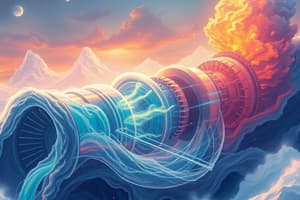Podcast
Questions and Answers
What does the efficiency of a water heater measure?
What does the efficiency of a water heater measure?
- The amount of fuel burned in the water heater
- The temperature rise of the water inside the heater
- The energy delivered to the house by hot water (correct)
- The volume of hot water produced
What is the heating value of a fuel?
What is the heating value of a fuel?
- The time taken for combustion
- The amount of heat released when burning the fuel (correct)
- The color of the flame
- The initial temperature of the fuel
How is the lower heating value (LHV) different from the higher heating value (HHV)?
How is the lower heating value (LHV) different from the higher heating value (HHV)?
- LHV includes the heat of vaporization, HHV does not (correct)
- LHV occurs at higher temperatures than HHV
- HHV is always lower than LHV
- HHV accounts for inefficiencies, LHV does not
What does a generator do?
What does a generator do?
How is generator efficiency defined?
How is generator efficiency defined?
What does the thermal efficiency of a power plant measure?
What does the thermal efficiency of a power plant measure?
What is the relationship between the power of a compact fluorescent lamp and an incandescent lamp of the same light output?
What is the relationship between the power of a compact fluorescent lamp and an incandescent lamp of the same light output?
Which of the following is the best definition of mechanical efficiency?
Which of the following is the best definition of mechanical efficiency?
What is the overall efficiency of a turbine-generator system?
What is the overall efficiency of a turbine-generator system?
If a fan has a mechanical efficiency of 0.80, what is the ratio of the kinetic energy of the air at the fan exit to the mechanical power input?
If a fan has a mechanical efficiency of 0.80, what is the ratio of the kinetic energy of the air at the fan exit to the mechanical power input?
What is the unit of mechanical power input to a fan?
What is the unit of mechanical power input to a fan?
Which of the following is the correct unit for mechanical energy per unit mass?
Which of the following is the correct unit for mechanical energy per unit mass?
The rate of mechanical energy of a flowing fluid per unit mass is equal to:
The rate of mechanical energy of a flowing fluid per unit mass is equal to:
The change in mechanical energy of a fluid during incompressible flow per unit mass is given by the expression:
The change in mechanical energy of a fluid during incompressible flow per unit mass is given by the expression:
The rate of mechanical energy change of a fluid during incompressible flow is proportional to:
The rate of mechanical energy change of a fluid during incompressible flow is proportional to:
According to the kinetic theory, heat is the energy associated with the:
According to the kinetic theory, heat is the energy associated with the:
Flashcards are hidden until you start studying



